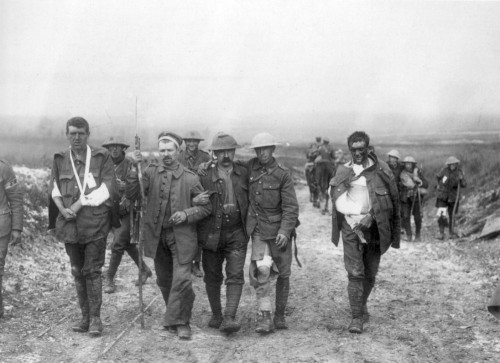Barack Obama responded to the murder by ISIS/ISIL of James Foley by stating, among other things, that “a group like ISIL has no place in the 21st century.”
Which paralleled his lecture about Vlad Putin’s actions, earlier this year: “…because you’re bigger and stronger taking a piece of the country – that is not how international law and international norms are observed in the 21st century.” Hey, what are you going to believe–Obama’s theories, or your lying eyes?
My response here to Obama’s comments concerning Putin are equally applicable to his more recent statement concerning ISIS/ISIL, aka the Islamic State…
The idea that the mere passage of time has some automatic magical effect on national behavior…on human behavior…is simplistic, and more than a little odd. I don’t know how much history Obama and Kerry actually studied during their college years, but 100 years ago..in early 1914…there were many, many people convinced that a major war could not happen…because we were now in the twentieth century, with international trade and with railroads and steamships and telegraph networks and electric lights and all. And just 25 years after that, quite a few people refused to believe that concentration camps devoted to systematic murder could exist in the advanced mid-20th century, in the heart of Europe.
Especially simplistic is the idea that, because there had been no military territory-grabs by first-rank powers for a long time, that the era of such territory-grabs was over. George Eliot neatly disposed of this idea many years ago, in a passage in her novel Silas Marner:
The sense of security more frequently springs from habit than from conviction, and for this reason it often subsists after such a change in the conditions as might have been expected to suggest alarm. The lapse of time during which a given event has not happened is, in this logic of habit, constantly alleged as a reason why the event should never happen, even when the lapse of time is precisely the added condition which makes the event imminent.
Or, as Mark Steyn put it much more recently:
‘Stability’ is a surface illusion, like a frozen river: underneath, the currents are moving, and to the casual observer the ice looks equally ‘stable’ whether there’s a foot of it or just two inches. There is no status quo in world affairs: ‘stability’ is a fancy term to dignify laziness and complacency as sophistication.
Obama also frequently refers to the Cold War, and argues that it is in the past. But the pursuit of force-based territorial gain by nations long predates the Cold War, and it has not always had much to do with economic rationality. The medieval baron with designs on his neighbor’s land didn’t necessarily care about improving his own standard of living, let alone that of his peasants–what he was after, in many cases, was mainly the ego charge of being top dog.
Human nature was not repealed by the existence of steam engines and electricity in 1914…nor even by the broad Western acceptance of Christianity in that year…nor is it repealed in 2014 by computers and the Internet or by sermons about “multiculturalism” and bumper stickers calling for “coexistence.”
American Digest just linked a very interesting analysis of the famous “long telegram” sent by George Kennan in 1947: George Kennan, Vladimir Putin, and the Appetites of Men. In this document, Kennan argued that Soviet behavior must be understood not only through the prism of Communist ideology, but also in terms of the desire of leaders to establish and maintain personal power.
Regarding the current Russian/Crimean situation, the author of the linked article (Tod Worner) says:
In the current crisis, many will quibble about the historical, geopolitical complexities surrounding the relationship between Russia, Ukraine and Crimea. They will debate whether Crimea’s former inclusion in the Russian Empire or Crimea’s restive Russian population justifies secession especially with a strong Russian hand involved. Papers will be written. Conferences will be convened. Experts will be consulted. Perhaps these are all prudent and thoughtful notions to consider and actions to undertake. Perhaps.
But perhaps we should, like George Kennan, return to the same questions we have been asking about human nature since the beginning of time. Maybe we are, at times, overthinking things. Perhaps we would do well to step back and consider something more fundamental, something more base, something more reliable than the calculus of geopolitics and ideology…Perhaps we ignore the simple math that is often before our very eyes. May we open our eyes to the appetites of men.
— essential
— a good addendum, depicting the German Army in the closing months of the war.
— pure nuts and bolts infantry fighting, zero philosophizing
(also @ Project Gutenberg) — the enlisted man’s view
— classic, on every short list
, Memoirs of an Infantry Officer
— very solid, not quite so literary as Graves
— both down to earth depictions
).
is very good on Austria Hungary up to the outbreak of the war. It is a great favorite of mine.
